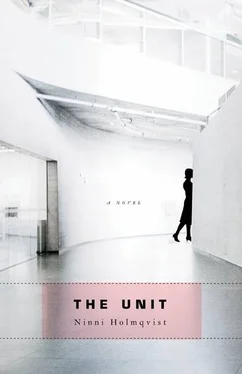“I didn’t get much written at that time-I was way too restless and desperate for company-but I had a really good time,” he ended his story.
Majken had been in the unit for four years, Alice for four months. Majken had, among other things, donated eggs for stem-cell research, one kidney, and the auditory bone from her right ear. As she was now deaf in that ear, she always wanted people to be on her left, she explained.
“And in a few weeks,” she went on, “I’m going in to donate my pancreas to a student nurse with four kids. So I guess this will be my last welcome party.”
She was moving her spoon around in her dessert, a distracted movement, it seemed to me-as if she didn’t mind, as if it didn’t bother her, as if it were completely okay. All of a sudden I felt completely powerless. Majken stirred and stirred with her spoon and I followed her hand and the spoon with my eyes, and with every rotation it felt as if the air in the big room were becoming thinner and more difficult to breathe. My body grew heavy, my arms ached, there was a thudding and rushing noise in my ears, I couldn’t see properly. I broke out in a cold sweat, and through a black, flickering mist I saw Majken’s hand stop its movement, let go of the spoon and grip my hand as it lay there in front of me next to my dish, limp and damp and cold. As if from far, far away, beyond the rushing in my ears, I heard her voice:
“Darling, you get used to it. Don’t you, Alice?”
I couldn’t see Alice. My field of vision had shrunk. I could only see Majken’s hand resting on mine. Alice said something, she was talking, reassuring me, but I couldn’t hear what she was saying because her voice was surging and fading, growing in turn stronger and weaker as if she were speaking in a strong wind, and only odd words were getting through. I opened my mouth, tried to say that I couldn’t hear her properly, but there wasn’t enough air. I couldn’t get my breath. I couldn’t focus. The dark flickering mist grew more dense and became a dark veil, a curtain. I could hardly see at all, and it felt as if the chair and the floor were about to give way beneath me, as if I were being sucked down into a hole. But then Alice was there too, stroking my arm with her hand, and now I could hear her. She was saying:
“It’s okay, darling, it’s okay…”
And Johannes, who was sitting beside me, put one arm around my shoulders. He placed his other hand on my forehead. As if I were a little child who might have a temperature. But it worked, it felt as if he were propping me up, keeping me there, stopping me from being sucked down into that hole or falling headfirst into the panna cotta . It felt as if they cared about me, all three of them, and I have always been calmed by the feeling that someone cares about me. Johannes said:
“There now… Take a deep breath. There. And breathe out slowly. Good. And again, Dorrit, nice and calm. That’s it, there now…”
We sat like that for quite a while: Majken holding my hand, Alice stroking my forearm and Johannes stroking my back slowly, and they all carried on murmuring “There now, it’s okay” until my senses and my breathing returned to normal. When Johannes finally took his hand away from my forehead, he did it by allowing it to slide down over my cheek, like a gentle caress.
There was entertainment. There was dancing. A rock band played. I danced with Johannes, Majken and Alice. And with Elsa and lots of other people. But I danced the most with Johannes. He had rhythm and feeling, and he knew proper ballroom dancing, with the right steps and everything. He could lead like a real old chauvinist, like an old-fashioned gentleman. At first I found it a bit difficult to keep up. Partly because I had never done this kind of dancing before, I’d only seen it in old films, partly because I felt a little bit exposed somehow, it almost felt dangerous, not being in charge of your own steps. But after a while I decided to ignore that feeling and just let myself be led and managed. And then it felt just wonderful, right up my alley.
It grew late. Elsa and I were standing at the bar, each with a pear drink. They served only nonalcoholic beverages, and if you didn’t want a soda there was only orange juice and a pear drink to choose from.
“Would you like to meet up tomorrow morning and have breakfast together?” I asked.
“Would you like to have breakfast tomorrow and then spend the next four days together?” Elsa asked.
As new arrivals we had four consecutive free days, Sunday to Wednesday. It was so we could make ourselves at home in the unit before the compulsory health check; after that we would be allocated to appropriate humane experiments or begin to donate. We were being given a gentle start. And when Elsa mentioned spending the next four days together I felt-to my surprise-an enormous sense of relief, and it made me realize that I was afraid of those four free days. It made me realize that for the first time in my adult life, I was afraid of being alone. So I accepted her invitation. No, I didn’t want to be alone. I didn’t want to be alone in a building without windows, where there wasn’t a living thing to fix your gaze on, not a thing to stop me from thinking about the fact that I would never again experience the feeling that flooded through me that morning in March each year when I opened my door and saw the first crocus of the year in bloom on my lawn. Or the first scilla or the first hepatica or the first scented violet. Or when I saw the cranes, trumpeting as they flew over in wide skeins on their way north to Lake Hornborga. And I didn’t want to think about Nils and our times together, his hands on my body, his kisses, his penis, his words telling me how much I meant to him. Above all I didn’t want to think about Jock, about the fact that we would never again run together in the forest or by the sea. Or take our walk along the tractor route to Ellström’s farm to buy fresh eggs and vegetables for me and a pig’s heart for him. I needed to erect a barrier of new experiences, a buffer zone between there and here, between then and now, before I had the courage to be alone with my thoughts again.
On the other hand, I wasn’t so afraid of the night. I wasn’t afraid to sleep without company. Since I wasn’t used to sleeping with other people in the same room, or even in the same house, I actually preferred it that way. And to be on the safe side I’d made sure I got myself some sleeping pills. Of course they were the kind that can’t send you off to sleep forever; they were the suicide-proof kind with a built-in antabuse effect: if you take more than two, you throw up.
When Elsa put her empty glass down on the bar and said she was tired and off to bed, I asked her if she wanted a sleeping pill.
She laughed.
“Thanks, but I’ve been to the doctor too and got myself some!”
We decided that whoever woke up first the next morning would ring the other, and after breakfast we would set off to explore the unit and make the most of everything being free. Then we hugged each other, said good night, and she left.
The last dance was a ballad. The singer stood in the middle of the stage, alone in the spotlight, the orchestra hidden in the darkness behind him. He sang: “This is for my girl, this is for my woman, for my world. Baby, baby, this is all for you…”
Johannes came over to me as I stood there with my lukewarm pear drink, swaying to the beat and humming along with the refrain. He bowed briefly and asked, very politely:
“May I have the pleasure?”
It was charming, I was charmed by his old-fashioned manner and his words, and without a second’s hesitation I put my glass on the bar, nodded graciously and held out my hand to him. He took it and placed his other arm quite formally around my waist. And we sailed out onto the dance floor. He led so confidently, in such a relaxed way and with such perfect timing that I didn’t even feel as if I couldn’t really dance like this. I almost fell into a trance, following him as easily as if I were a part of him, as if we were the same body.
Читать дальше












